Nothing about us without us: Highlights from our town hall
“If we sit down and talk about the problem together, maybe we can come up with some solutions” – Bernice Kamano, Greater Victoria Coalition to End Homelessness Speakers Bureau
Sometimes the most important conversations are the most difficult to have. However, those conversations become much easier when they occur in an open, compassionate and inclusive environment. And that is exactly the type of environment I had the honour of being a part of last night for my Town Hall event — Poverty and Homelessness: The Difficult Conversation.
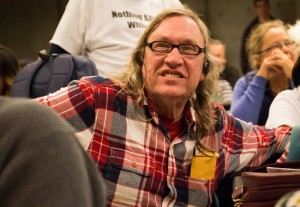 Before I delve into what was shared and what we learned last night, I’d like to once again offer my sincere thanks to Reverend Al Tysick for the time and work he put in to ensure that his family could make it to our event. I’d also like to express my deep gratitude to Reverend Al’s family and friends for sharing their profoundly moving personal stories with us. To our four wonderful panelists, I thank you on behalf of everyone in the audience for taking the time out of your busy schedules to offer us your valuable insight into the issue of poverty and homelessness. And special thanks to Cairine Green for graciously volunteering to moderate the evening. I am also blessed to be supported by truly incredible constituency and legislature staff and volunteers. Without their assistance, our town hall would simply never have happened.
Before I delve into what was shared and what we learned last night, I’d like to once again offer my sincere thanks to Reverend Al Tysick for the time and work he put in to ensure that his family could make it to our event. I’d also like to express my deep gratitude to Reverend Al’s family and friends for sharing their profoundly moving personal stories with us. To our four wonderful panelists, I thank you on behalf of everyone in the audience for taking the time out of your busy schedules to offer us your valuable insight into the issue of poverty and homelessness. And special thanks to Cairine Green for graciously volunteering to moderate the evening. I am also blessed to be supported by truly incredible constituency and legislature staff and volunteers. Without their assistance, our town hall would simply never have happened.
“We don’t need to come up with new solutions, they are already there. We need to get politicians and policy to enact the solutions.” – Bruce Wallace, assistant professor in the School of Social Work at the University of Victoria
While the discussions last night may not have provided any new, groundbreaking solutions to bring an immediate end to homelessness and poverty in Greater Victoria, they did highlight the best practice solutions that already exist and what needs to be done to put them into practice.
Some of the key issues that were discussed by our panelists included:
1) systemic failures, such as lack of government strategies for ending homelessness (both nationally and provincially) and people falling through the cracks when accessing services that are in place;
2) structural issues, including low incomes, high rents and lack of affordable and supportive housing;
3) personal circumstances, such as mental health, unemployment and family situations.
Research has found that best practice solutions to these issues include:
1) Housing First policies – like those implemented in Medicine Hat and Utah;
2) provincial poverty reduction plans – as has been proposed by the BC Poverty Reduction Coalition;
3) increasing minimum wage – which is more than $8/hour below living wage in our region;
4) increasing income assistance – which hasn’t changed in almost 10 years despite inflation and higher living costs.
“Solutions are based on philosophies that don’t resonate with aboriginal people” – Bernice Kamano
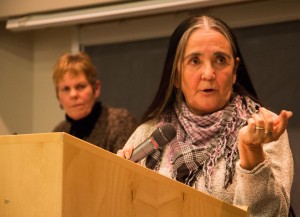 Another important issue that was highlighted last night and that too often gets overlooked when discussing poverty and homelessness is the disproportionate number of aboriginal people living on the street. In Vancouver, at least 30% of the street population identify themselves as aboriginal. Meanwhile aboriginal people make up only 2% of the city’s entire population. Given these deplorable statistics, there is a clear need for services and solutions that address the unique needs and challenges faced by aboriginal people. But creating these solutions can only be done by giving the aboriginal community a voice when planning and making decision to eradicate homelessness.
Another important issue that was highlighted last night and that too often gets overlooked when discussing poverty and homelessness is the disproportionate number of aboriginal people living on the street. In Vancouver, at least 30% of the street population identify themselves as aboriginal. Meanwhile aboriginal people make up only 2% of the city’s entire population. Given these deplorable statistics, there is a clear need for services and solutions that address the unique needs and challenges faced by aboriginal people. But creating these solutions can only be done by giving the aboriginal community a voice when planning and making decision to eradicate homelessness.
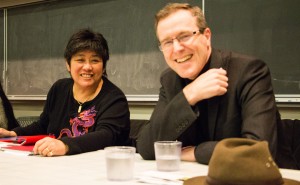 To address this need, Bernice Kamano and Andrew Wynn-Williams, Executive Director for the Greater Victoria Coalition to End Homelessness, shared with us the Coalitions current efforts to create an Aboriginal Coalition to End Homelessness. This new coalition would bring together both elected and hereditary chiefs and other members of the aboriginal community to examine the key issues behind and the solutions to the high rates of poverty and homelessness amongst aboriginal communities.
To address this need, Bernice Kamano and Andrew Wynn-Williams, Executive Director for the Greater Victoria Coalition to End Homelessness, shared with us the Coalitions current efforts to create an Aboriginal Coalition to End Homelessness. This new coalition would bring together both elected and hereditary chiefs and other members of the aboriginal community to examine the key issues behind and the solutions to the high rates of poverty and homelessness amongst aboriginal communities.
“I am a messenger for things I have learned from people, including many in the audience tonight” – Charlayne Thornton-Joe, Victoria City Council
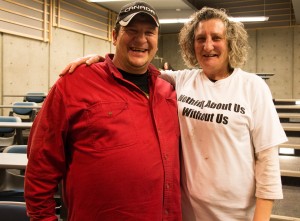 While the presentations by the panelists proved thoughtful and informative, the true highlight of the evening was the open discussion that ensued afterwards. It is not often that you find yourself in an at-capacity lecture hall, discussing issues surrounding poverty and homelessness with those who are currently homeless, those working on the front lines to end homelessness, elected officials and other members of the community.
While the presentations by the panelists proved thoughtful and informative, the true highlight of the evening was the open discussion that ensued afterwards. It is not often that you find yourself in an at-capacity lecture hall, discussing issues surrounding poverty and homelessness with those who are currently homeless, those working on the front lines to end homelessness, elected officials and other members of the community.
In an open-minded, inclusive and caring environment people were able to express their frustrations, share their stories and better understand what it means to live in poverty. Questions and comments were diverse and included inquiries about Guaranteed Livable Income policies, the need for affordable housing, the reliance on a charity model and use of emergency shelters as housing, and the costs to society of inaction versus action.
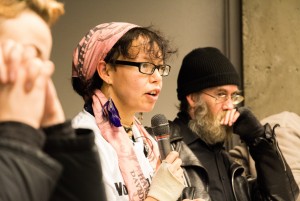 The solutions to these problems are not ones that any one person can provide. They require long-term planning, commitment and collaboration from non-profit organizations and all levels of government. However, that does not mean there is nothing that you as an individual can do to make a difference. One of the last questions that was asked may prove most meaningful to many of you: “What can average, everyday people do when faced with homelessness on the street?”
The solutions to these problems are not ones that any one person can provide. They require long-term planning, commitment and collaboration from non-profit organizations and all levels of government. However, that does not mean there is nothing that you as an individual can do to make a difference. One of the last questions that was asked may prove most meaningful to many of you: “What can average, everyday people do when faced with homelessness on the street?”
For the answer to this question our panelists directed us to the people in the audience that could respond to this question best — Reverend Al’s family. Their answer was simple and unanimous: be compassionate. Smile, say hello, have a conversation. Don’t act like they’re invisible. Treat them like you would anyone else you pass on the street, because we’re all just people and we all need to know that someone cares.
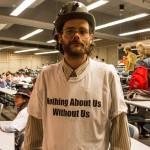 I made a commitment yesterday — a commitment to continue raising awareness and offering solutions to systemic issues of poverty and homelessness over the weeks and months ahead. And I promised that at our next town hall, we will come to you Reverend Al and family.
I made a commitment yesterday — a commitment to continue raising awareness and offering solutions to systemic issues of poverty and homelessness over the weeks and months ahead. And I promised that at our next town hall, we will come to you Reverend Al and family.
Photos Credit: Britt Swoveland

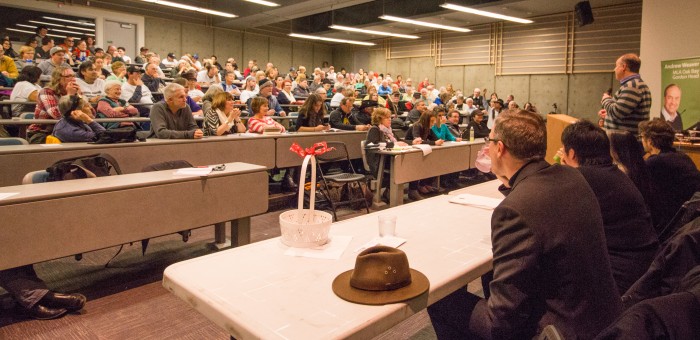
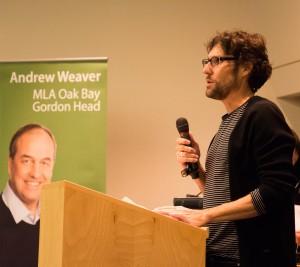
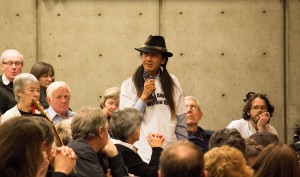



2 Comments
Thank you Matt for your comments. The town hall was a very moving experience for me. To hear you and others share your stories had a profound effect on everyone there. I have sent you an email.
I wanted to say a very heartfelt, sincere thank you for your comments and the wonderful message that this blog has. I am the gent with the top hat in the final picture, and when my chance to speak came, I was a little overwhelmed, and didn’t say all that i wanted to. But I must say that you NAILED it. Your comments about taking the time to treat us as individuals, as people… Words fail me.Even I, as unique as I look, feel invisible all the time, and THAT is what hurts the most. That feeling of being apart from, rather than a part OF. Again, words fail me. Thank you, from the bottom of my heart.
Matthew Harasimo
Rock Bay Landing